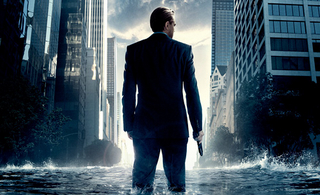Christopher Nolan’s stunning latest film, Inception, which opened last week has received acclaim from critics and audiences alike. Could it be the film’s exploration of the human subconscious? Or perhaps because of the impressive special effects? Perhaps it is seeing Nolan’s ‘Dream Team’ cast work together wonderfully on screen? Or one could rightly say it is all of the above.
Anticipation for this film has been steadily growing throughout the past few months mostly because the director also crafted the smash hits “Batman Begins” and “The Dark Knight,” and partly because of the film’s ambiguous promotion. Unyielding questions such as “what is Inception?” and the beautiful way that the film unfolds on screen leads its audience deep into the mysterious universe of dreams where reality and imagination quickly blur together.
Leonardo DiCaprio plays Dom Cobb, a dream extractor whose job is to steal his targets’ secrets by sharing their dreams. After a job goes bad, Cobb and his partner Arthur (Joseph Gordon-Levitt 500 Days of Summer) must put together a fresh team to pursue a radical new idea: planting an idea within the mind of a target instead of extracting an idea. Can it be done? The plot hinges on this all-important question. For Cobb, an exile from his country, the prospect of returning is a payoff well worth the risk. His stubborn determination to perform this one last job, along with the fascination of conquering the impossible, carries the plot forward.
A team quickly forms: the Architect, the Forger, the Chemist and the Tourist, each of whom play a unique part within the “art” of inception. Ellen Page (Juno) does a wonderful job of playing Ariadne, the architect whose job is construct the dream world the team will enter. Along the way, she also delves into Cobb’s subconscious, unraveling his complicated past with the beautiful woman Mal (Marion Cotillard). The casting of these two unexpected actresses demonstrates Nolan’s meticulous attention to detail which elevates the film throughout.
Nolan’s artistic hand is also evident in the sprawling landscapes he uses as backgrounds, the intricate plot devices, and the emphasis he places on story-telling. The highlight of the film is its mysterious plot. Just as a dream’s architect must construct a dream well enough that the target believes it, Nolan constructs multiple worlds throughout the film that suck the viewer into living in them, as though in a dream themselves. With action occurring simultaneously at several levels, the film is better followed than figured out.
The film’s climax is a festival of visual wonder as brawling fights take place without the burden of gravity as well as the characters visually “riding the kick” up from one dream world to the next. The ending, however, is pure cinematic gold. Of course it is nothing new to use the “it was all a dream” device within movie plots, but for Inception, it takes on an entirely new meaning.
In an industry that all too often abuses the power of the screen, Inception is an awe-inspiring film that reminds audiences why movies are made. And its ending will leave people wondering and debating for years to come.







